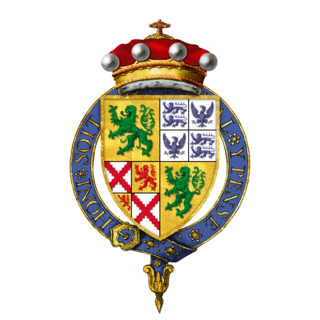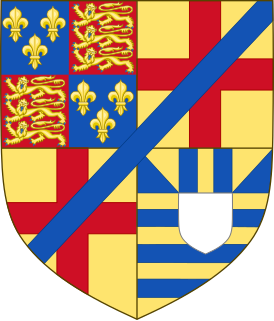
Thomas Grey, 1st Marquess of Dorset, 1st Earl of Huntingdon, 7th Baron Ferrers of Groby, was an English nobleman, courtier and the eldest son of Elizabeth Woodville and her first husband Sir John Grey of Groby. Her second marriage to King Edward IV made her Queen of England, thus elevating Grey's status at court and in the realm as the stepson of the King. Through his mother's assiduous endeavours, he made two materially advantageous marriages to wealthy heiresses, the King's niece Anne Holland and Cecily Bonville, 7th Baroness Harington. By the latter he had 14 children.

Baron Hazlerigg, of Noseley in the County of Leicester, is a title in the Peerage of the United Kingdom. It was created in 1945 for Sir Arthur Hazlerigg, 13th Baronet. He had previously served as Lord Lieutenant of Leicestershire. As of 2017 the titles are held by his grandson, the third Baron, who succeeded his father in 2002.

Sir Edward Sutton, 2nd Baron Dudley, was a Member of Parliament (MP) of the Parliament of England from 12 August 1492 to 3 November 1529. He was one of the English noblemen elected as Knight of the Garter (KG) in the beginning of King Henry VIII's reign. He was chamberlain to Princess Mary from 1525 to 1528.
Earl of Sussex is a title that has been created several times in the Peerages of England, Great Britain, and the United Kingdom. The early Earls of Arundel were often also called Earls of Sussex.

Arthur Plantagenet, 1st Viscount Lisle, KG was an illegitimate son of the English king Edward IV, half-brother-in-law of Henry VII, and an uncle of Henry VIII, at whose court he was a prominent figure and by whom he was appointed Lord Deputy of Calais (1533–40). The survival of a large collection of his correspondence in the Lisle Letters makes his life one of the best-documented of his era.
The Comptroller of the Household is an ancient position in the British royal household, nominally the second-ranking member of the Lord Steward's department after the Treasurer of the Household. The Comptroller was an ex officio member of the Board of Green Cloth, until that body was abolished in the reform of the local government licensing in 2004. In recent times, a senior government whip has invariably occupied the office. On state occasions the Comptroller carries a white staff of office, as often seen in portraits.
The Chemical Society was formed in 1841 by 77 scientists as a result of increased interest in scientific matters. Chemist Robert Warington was the driving force behind its creation.
The Lord Deputy was the representative of the monarch and head of the Irish executive under English rule, during the Lordship of Ireland and then the Kingdom of Ireland. He deputised prior to 1523 for the Viceroy of Ireland. The plural form is "Lords Deputy".
This is a list of the High Sheriffs of the English county of Northumberland. The High Sheriff is the oldest secular office under the Crown. Formerly the High Sheriff was the principal law enforcement officer in the county but over the centuries most of the responsibilities associated with the post have been transferred elsewhere or are now defunct, so that its functions are now largely ceremonial. The High Sheriff changes every March.

Sir Edward Grey, 1st Viscount Lisle was an English nobleman who was created Viscount Lisle in 1483, in recognition of his wife's descent.
The 1902 Coronation Honours were announced on 26 June 1902, the date originally set for the coronation of King Edward VII. The coronation was postponed because the King had been taken ill two days before, but he ordered that the honours list should be published on that day anyway.
The 1889 Birthday Honours were appointments by Queen Victoria to various orders and honours to reward and highlight good works by citizens of the British Empire. The appointments were made to celebrate the official birthday of The Queen, and were published in the London Gazette on 24 May 1889 and in The Times on 25 May 1889.
The 1875 Birthday Honours were appointments by Queen Victoria to various orders and honours to reward and highlight good works by citizens of the British Empire. The appointments were made to celebrate the official birthday of the Queen, and were published in The London Gazette in May and June 1875.